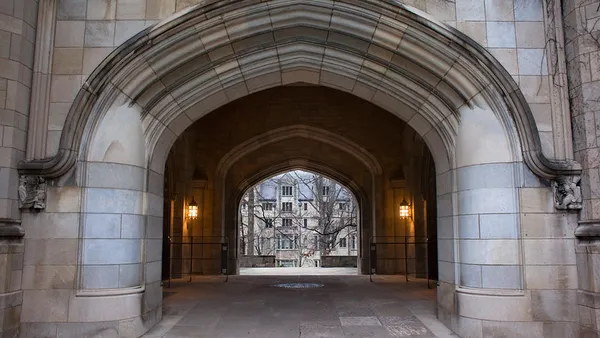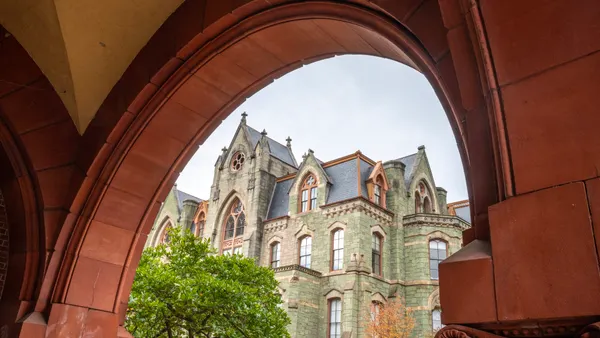Junior Mares is a sophomore studying computer science at Dominican University, in the Chicago suburb of River Forest, Illinois. But his ability to stay in school and get a job afterward depend largely on a controversial Obama-era federal immigration program that could soon end, depending on the outcome of a case now before the U.S. Supreme Court.
When Mares was three years old, his parents brought him from Mexico to the U.S., where he grew up in Illinois and Texas. He says he has no memories of Mexico. Usually, people in Mares' situation would not be able to work legally in the U.S. They could be deported at any time.
But when Mares was a teenager, he signed up for the Deferred Action for Childhood Arrivals (DACA) program that the Obama administration created in 2012. The program allows young immigrants brought illegally to the U.S. as children certain protections from deportation as well as permission to work. Nearly 700,000 people, often referred to as "Dreamers," are enrolled in the program.
"If it wasn't for the (DACA) program, I wouldn't be doing anything that I'm doing right now," Mares said. "I wouldn't be president of a club. I wouldn't have gone through an internship. I wouldn't have a job to help my parents. I wouldn't have had the scholarship to help me go to school. I wouldn't have gone to school at all. I would've been working in probably a hard labor."
The Supreme Court will hear oral arguments Tuesday over whether the DACA program should continue. The key question isn't about the program's merits but whether the Trump administration two years ago tried to end it in the right way.
Higher education groups have been a major part of the case, and they have rallied around the policy. More than 180 colleges and universities have signed on to friend-of-the-court briefs urging the court not to end the program. Organizations representing medical education providers and thousands of other higher education institutions have done the same.
Colleges and universities have a lot at stake: More than 120,000 of the 700,000 DACA recipients were enrolled in some form of postsecondary education as of September 2017, according to one estimate. Some schools also employ DACA participants as faculty or staff. And many emphasize that their underlying missions call for improving diversity and promoting education broadly.
On top of that, national organizations representing school boards, superintendents and principals warned in a brief filed with the Supreme Court of a "whiplash" that will "have a devastating impact not only on the young people who have come to rely on DACA, but on schools, school communities and countless other educational and social institutions that depended on the stability of the (federal government's) interpretation."
"I don't think people understand how massive this issue is," said Maria Gabriela Pacheco, director of advocacy for TheDream.US, which provides college scholarships for DACA students.
Several Republican-leaning states are backing the administration's appeal and its attempt to end DACA.
Lawyers for a dozen states, including Texas, wrote in a friend-of-the-court brief that Congress "has never given the Executive carte blanche to grant lawful presence to any alien it chooses not to remove, let alone benefits including work authorization, health care, unemployment, and a pathway to citizenship."
An argument about procedure
The justices will be looking at the steps the Trump administration took when it decided in the fall of 2017 to end DACA.
When the Obama administration created the program in 2012, it argued that it could do so because Congress gave the immigration agencies prosecutorial discretion in deciding which immigrants to deport and which ones not to.
The Trump administration tried to end the program in September 2017. Its officials argued DACA was illegal based on court decisions that struck down a different — but related — Obama administration program.
Several organizations, including the University of California System and the NAACP, challenged the memo in court. (The UC System has 1,700 students in DACA, and its president, Janet Napolitano, helped create the program as Obama's homeland security secretary.)
A handful of lower courts blocked the Trump administration from immediately ending DACA but let it bar new applicants from joining. The Trump administration appealed to the Supreme Court, which eventually agreed to take the case.
Immigrant advocates say the Trump administration never showed how it reached its decision to end DACA. They say previous court rulings require executive agencies to acknowledge they are changing positions and justify their reasons for doing so when many people rely heavily on the existing interpretation.
DACA participants have indeed relied on the Obama administration's interpretation, immigrant advocates say. Enrollees paid hundreds of dollars to enter the program, made major life decisions (such as attending college) based on the assumption it would continue and even turned over personal information to federal immigration authorities to participate.
But the only records the Trump administration produced to justify its move were "256 pages of publicly available documents," said Mayra Joachin, a staff attorney for the National Immigration Law Center. "What the government has not done to this point is to show why they reached a decision that DACA was unlawful," she said. "What they're effectively doing now is just providing post-hoc justification."
Another point of contention in the case is how much the justices should pay attention to lower court rulings that struck down the other Obama-era immigration policy, called the Deferred Action for Parents of Americans and Lawful Permanent Residents (DAPA) program. A Texas-based federal court blocked DAPA before it could take effect.
The Trump administration relied on that decision to argue that DACA is illegal. But immigrant advocates say the two programs have big differences. DAPA, they say, created an alternate scheme for parents of U.S. citizens to obtain legal status that differed significantly from existing federal immigration law. But lawyers defending DACA say there is no similar conflict between DACA's procedures and existing immigration statutes.
In any case, DACA is on shaky ground. Even if immigrant advocates win, the Trump administration could try again to end the program.
"At the end of the day, it's not about the legality of DACA, it's about the process," said TheDream.US's Pacheco, a former DACA recipient herself. "If the Supreme Court says, 'Yes, indeed, the Trump administration did it wrong,' all they have to do is do it correctly, and the program will still end."
If the court allows the administration to end DACA, however, the ruling's impact could vary significantly depending on how the court or the administration choose to wind down the program.
That applies both to the immigrants themselves and their employers or institutions, including colleges and K-12 schools.
If the ruling takes effect right away, it would "have a huge impact on universities," said María Blanco, executive director of the UC Immigrant Legal Services Center at the UC Davis School of Law. Universities that have hired DACA participants as professors or teaching assistants could find themselves with classes that have no instructors. And DACA students often depend on the program to work at the university or off campus in order to make college affordable.
"Universities would have to scramble," she said. "We're very worried about it."
Pacheco said it is unlikely DACA could shut down overnight. In similar cases, the courts have let the programs slowly wind down, she notes.
The 2020 presidential campaign could also play a role in how the administration phases out DACA. The high court's decision could come down as late as June of next year, just as the general election heats up. That could make administration officials hold off on ending protections for the immigrants. Even if it didn't, a gradual wind-down might not be possible before the next presidential term begins in January 2021.
The personal impact
Ernest Cartledge, the director of enrollment services and registrar at Montgomery College, a community college in Maryland that enrolls some 300 DACA students, said he's noticed increased apprehension among students since the program has been in jeopardy. Not only are they worried it will end, he said, but they're also concerned the personal information they submitted for the program will end up in the hands of federal immigration agents.
Montgomery College officials — including the president, trustees and faculty — have tried to show their support for DACA and reassure those students they won't share information with federal immigration authorities. The college's foundation would probably step in to help immigrants financially if DACA is struck down, Cartledge said, but funds might be limited. The college prides itself on being an open-access institution, so being able to help DACA students is important, he said.
In February 2017, just after Trump's inauguration, the college's board of trustees tried to reassure its DACA recipients and other community members in a campuswide memo. "The College will continue to affirm the rights of all persons to study and pursue opportunity through education, free from fear and distraction," it said. "Our institution will continue to be a place where diversity thrives and where difference is celebrated."
Mares tries not to think too much about the DACA litigation, but he knows the stakes are high.
DACA participants have been able to take part in American life in ways most unauthorized immigrants often cannot. In addition to being mostly shielded from deportation and allowed to work legally, in many states they can obtain professional and driver's licenses. And they can study at public universities — often qualifying for in-state tuition — and participate in internships and study abroad.
When he learned the Trump administration wanted to end DACA, Mares said he "felt frustrated and scared and clueless." He imagined sitting at home doing nothing because he wasn't legally allowed to do anything.
That's a far different outcome from the one he's planning for, in which DACA still exists and he'll move anywhere in the U.S. for a good job as a computer programmer.
In the meantime, Mares encourages colleges and others to welcome DACA students. "As far as they know, they're American," Mares said of himself and other DACA participants. "Don't make them feel any different."











